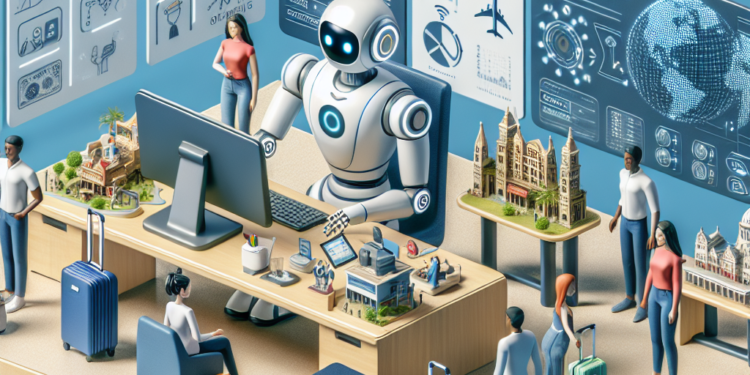Artificial Intelligence (AI) has revolutionized almost every industry, and the travel industry is no exception. With the help of AI tools, travel companies can now offer personalized recommendations, streamline operations, improve customer service, and optimize their marketing efforts. In this article, we will review some of the best AI tools that are revolutionizing the travel industry.
1. Chatbots
Chatbots have become a popular tool in the travel industry, offering customers an easy way to get answers to their questions and make bookings. These AI-powered bots can understand and respond to natural language queries, providing customers with a seamless and personalized experience. Chatbots can handle a wide range of tasks, including booking flights, hotels, car rentals, and providing travel recommendations. Some popular chatbot platforms for the travel industry include IBM Watson, Microsoft Bot Framework, and Dialogflow.
2. Predictive Analytics
Predictive analytics is another powerful AI tool that is transforming the travel industry. By analyzing historical data, predicting customer behavior, and identifying trends, travel companies can make more informed decisions and improve their marketing strategies. Predictive analytics can help companies forecast demand, optimize pricing, personalize marketing campaigns, and create targeted offers for customers. Some popular predictive analytics tools for the travel industry include Google Analytics, Adobe Analytics, and IBM SPSS.
3. Virtual Assistants
Virtual assistants are AI-powered tools that can help travelers plan their trips, book accommodations, and get real-time information about their destinations. These assistants can provide personalized recommendations, suggest activities, and answer questions about the travel itinerary. Virtual assistants can also assist travelers during their trip, providing updates on flight status, weather conditions, and local events. Some popular virtual assistants for the travel industry include Alexa, Google Assistant, and Siri.
4. Recommendation Engines
Recommendation engines use AI algorithms to analyze user preferences and suggest personalized recommendations for travel accommodations, activities, and destinations. These engines can help travelers discover new places, find suitable accommodations, and plan their itineraries based on their interests. Recommendation engines can improve customer satisfaction, increase bookings, and drive revenue for travel companies. Some popular recommendation engines for the travel industry include Amazon Personalize, Boomtrain, and RichRelevance.
5. Sentiment Analysis
Sentiment analysis is a valuable tool for the travel industry, allowing companies to monitor customer feedback, sentiment, and opinions across multiple channels. By analyzing social media posts, reviews, and comments, travel companies can identify trends, address customer concerns, and improve their products and services. Sentiment analysis can help companies understand customer preferences, predict behavior, and make data-driven decisions. Some popular sentiment analysis tools for the travel industry include Brandwatch, Talkwalker, and Sysomos.
6. Image Recognition
Image recognition technology uses AI algorithms to analyze and interpret visual content, such as photos and videos. In the travel industry, image recognition tools can help companies categorize, tag, and search for images, making it easier to manage visual assets and create compelling marketing campaigns. Image recognition can also help travelers search for destinations, identify landmarks, and discover new experiences based on visual cues. Some popular image recognition tools for the travel industry include Clarifai, ImageKit, and Imagga.
7. Revenue Management Systems
Revenue management systems (RMS) use AI algorithms to analyze demand, forecast availability, and optimize pricing strategies for travel companies. These systems can help companies maximize revenue, increase profitability, and improve customer satisfaction by dynamically adjusting prices based on demand and market conditions. Revenue management systems can also help companies identify trends, evaluate competitor pricing, and optimize distribution channels. Some popular revenue management systems for the travel industry include Duetto, IDeaS, and Rainmaker.
8. Dynamic Pricing
Dynamic pricing is a strategy that uses AI algorithms to adjust prices in real-time based on demand, competition, and other factors. In the travel industry, dynamic pricing can help companies maximize revenue, improve profitability, and increase customer loyalty by offering personalized and competitive prices. Dynamic pricing can help companies attract price-sensitive customers, fill empty seats, and increase overall revenue. Some popular dynamic pricing tools for the travel industry include Beyond Pricing, PriceLabs, and Wheelhouse.
In conclusion, AI tools are transforming the travel industry, enabling companies to offer personalized recommendations, streamline operations, improve customer service, and optimize their marketing efforts. From chatbots and predictive analytics to recommendation engines and image recognition, AI tools are revolutionizing the way travel companies operate and interact with customers. By leveraging these tools, travel companies can stay ahead of the competition, drive revenue, and deliver memorable experiences for their customers.













